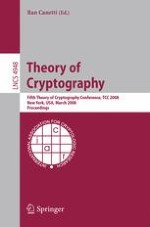2008 | OriginalPaper | Buchkapitel
Matroids Can Be Far from Ideal Secret Sharing
verfasst von : Amos Beimel, Noam Livne, Carles Padró
Erschienen in: Theory of Cryptography
Verlag: Springer Berlin Heidelberg
Aktivieren Sie unsere intelligente Suche, um passende Fachinhalte oder Patente zu finden.
Wählen Sie Textabschnitte aus um mit Künstlicher Intelligenz passenden Patente zu finden. powered by
Markieren Sie Textabschnitte, um KI-gestützt weitere passende Inhalte zu finden. powered by
In a secret-sharing scheme, a secret value is distributed among a set of parties by giving each party a share. The requirement is that only predefined subsets of parties can recover the secret from their shares. The family of the predefined authorized subsets is called the access structure. An access structure is ideal if there exists a secret-sharing scheme realizing it in which the shares have optimal length, that is, in which the shares are taken from the same domain as the secrets. Brickell and Davenport (J. of Cryptology, 1991) proved that ideal access structures are induced by matroids. Subsequently, ideal access structures and access structures induced by matroids have received a lot of attention. Seymour (J. of Combinatorial Theory, 1992) gave the first example of an access structure induced by a matroid, namely the Vamos matroid, that is non-ideal. Beimel and Livne (TCC 2006) presented the first non-trivial lower bounds on the size of the domain of the shares for secret-sharing schemes realizing an access structure induced by the Vamos matroid.
In this work, we substantially improve those bounds by proving that the size of the domain of the shares in every secret-sharing scheme for those access structures is at least
k
1.1
, where
k
is the size of the domain of the secrets (compared to
$k+ \Omega(\sqrt{k})$
in previous works). Our bounds are obtained by using non-Shannon inequalities for the entropy function. The importance of our results are: (1) we present the first proof that there exists an access structure induced by a matroid which is not nearly ideal, and (2) we present the first proof that there is an access structure whose information rate is strictly between 2/3 and 1. In addition, we present a better lower bound that applies only to
linear
secret-sharing schemes realizing the access structures induced by the Vamos matroid.
